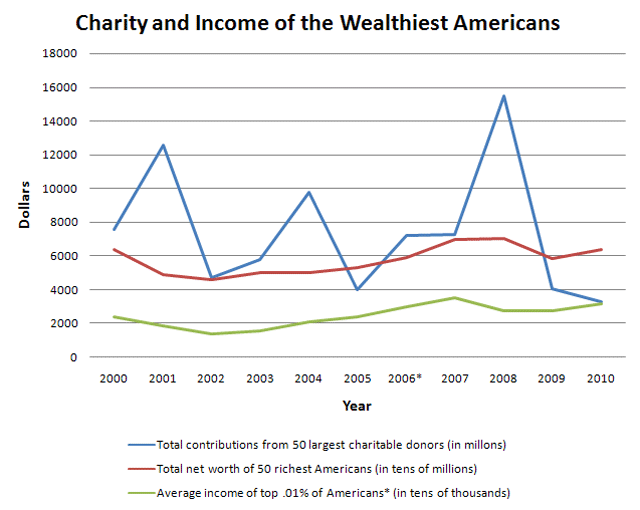This week, the Chronicle of Philanthropy reported that large donations to charitable organizations plummeted in 2010 to the lowest level seen since it began tracking them a decade ago. The Chronicle’s Philanthropy 50, the 50 most generous donors in America, gave a combined total of just $3.3 billion, a mere 20 percent of what they gave in 2008. It’s tempting to cut the mega rich some slack for their stingy ways, given that the recession took a significant bite out of their net worth and incomes. Yet as a group they’ve substantially recovered from those losses. In fact, there has historically been a somewhat counter-intuitive relationship between large charitable contributions and the financial health of America’s fat cats:
 Sources: Philanthropy 50, Forbes 400, income data via Politifact
Sources: Philanthropy 50, Forbes 400, income data via Politifact
Notice that only some portions of this graph match up with conventional wisdom: Between 2001 and 2004, 2005 and 2007, and 2008 and 2009, large charitable donations rose or fell in concert with the incomes and net worth of the richest Americans. During the other periods in the past decade, however, big donations moved in the opposite direction from the financial well-being of the über wealthy. Rich people lost their shirts during the tech crash of 2001 yet gave 66 percent more in big charitable donations than they had in 2000. The same thing happened in the early part of the recession that officially began in late 2007. In a more recent trend towards selfishness, however, the rich cashed in on 2010’s bull market while making even fewer big bequests than they did during the economic seesaw of 2009.
So what gives? Maybe the wealthy can’t bear to part with their money at a time when the stock market is going gangbusters; they want to grow every last penny. The opposite could be true when the market’s falling. But a more likely explanation, in my view, is that there’s simply a tenuous relationship between extreme wealth and charity. Indeed, the Chronicle of Philanthropy points out that only 17 of the 50 people on the Philanthropy 50 are wealthy enough to show up on Forbes magazine’s list of the 400 wealthiest Americans. A lot of rich people are simply greedy. As the uneven economic recovery further enriches the wealthy and impoverishes the middle class, it seems that most of America’s plutocrats aren’t feeling the pangs of conscience.
*A few notes on methods: I omitted a $50 billion donation from Warren Buffett in 2006 because it’s totally out of scale with all other donations. I also projected the green line in 2009 and 2010 based on the DJIA and Forbes 400 since data for those years is not yet available.














